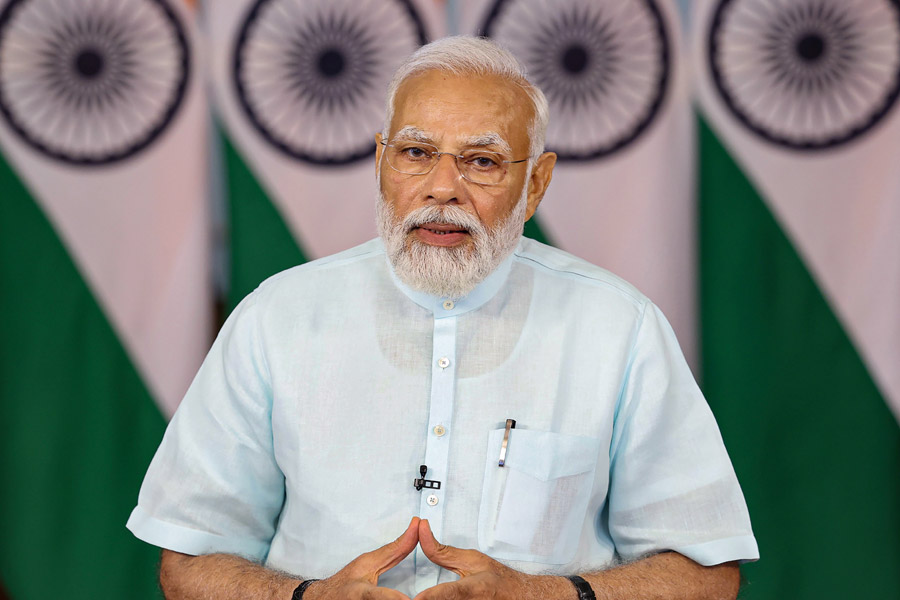Standing on a stage in the middle of Sydney’s Qudos Bank Arena, the Australian prime minister, Anthony Albanese, joined the growing list of world leaders who have concluded that flattering Narendra Modi is the most effective way to get deals done with New Delhi. Albanese told a thronging crowd of Narendra Modi supporters that their response to the visiting Indian prime minister’s arrival at the venue reminded him of a Bruce Springsteen concert he had seen there. “And he [Springsteen] did not get the welcome that Prime Minister Modi has got,” he said. “Prime Minister Modi is ‘The Boss’,” he added, referring to the nickname millions of adoring fans know Springsteen by.
It was a moment that should have made Modi cringe. Instead, he laughed out, clapped his hands, and nodded along as the saccharine words of a political salesman from Australia echoed around him. It was embarrassing because a prime minister who revels in the narrative of rising from humility to serve the people should baulk at efforts by foreign peers to make bilateral ties about him, rather than about India. Nine years into Modi’s tenure, there is no evidence that the prime minister’s personal popularity among sections of the Indian diaspora has helped the country’s diplomats secure clear gains in the nation’s interests.
It was embarrassing because this is now a trend. When Indian officials selectively and anonymously leak to the press comments by world leaders praising Modi when they meet him privately, as recently happened with president of the United States of America, Joe Biden, in Japan on the margins of the G7 Summit, they reinforce a message to other nations that puffery works with India’s leader.
It was embarrassing because Springsteen, arguably the greatest folk icon in the American music pantheon since Woody Guthrie, hates being called ‘The Boss’ as it symbolises authority over others, something he detests.
And it was embarrassing because Modi is no Springsteen — and can never be anything like him. In fact, Modi’s team, while fascinated by the US rock legend, clearly doesn’t get him at all. When in 2014, the still-new prime minister held the first of his mega stadium shows with the diaspora, at Madison Square Garden in New York, dancers had performed to “Born in the USA”
Clearly lost on the organisers was the fact that the thumping, fast-paced classic by Springsteen is not an ode to the US but a sharp, subversive critique of its militarism, penned and sung in the context of the Vietnam War.
Springsteen’s greatest songs are about the hollowing out of small-town America and the exploitation of workers by rapacious industrial houses — the very kind of corporates that Modi has embraced and given sops to. His most powerful ballads are about inclusivity — a theme that the prime minister sadly seems to remember only occasionally. Unlike Modi’s performances, the singer’s songs work precisely because they are never about him —but about the little guy ignored or shoved aside by the machine that is American capitalism.
Ironically, it was while on tour in Australia, during a concert in Adelaide in January 2017, that Springsteen publicly criticised the Donald Trump administration’s ban on visitors from predominantly Muslim nations as “anti-democratic and fundamentally un-American.” If Springsteen was Indian and had used a public platform to criticise the Modi government’s controversial December 2019 amendment to the citizenship law, which discriminates against Muslim asylum-seekers, he would likely have been called an ‘urban Naxal’ or worse by the prime minister’s colleagues.
Albanese must know all of this. He is presumably doing what he thinks he must to strengthen ties with India. What is disturbing is how Modi and the Indian government are feeding into the belief that massaging the prime minister’s ego publicly is the path to influence in New Delhi. In a democracy, there must be only one boss: the people.
Charu Sudan Kasturi is a senior journalist who writes on foreign policy and international relations











